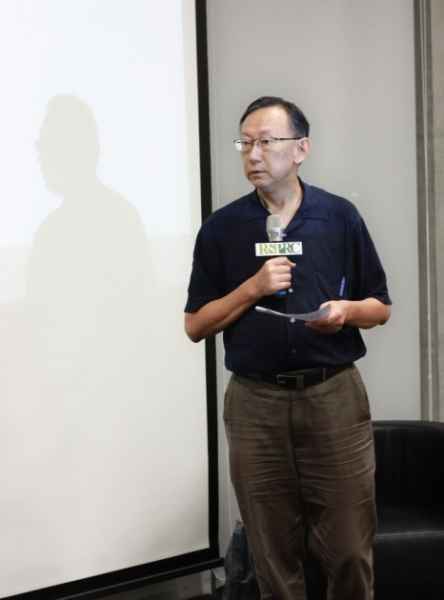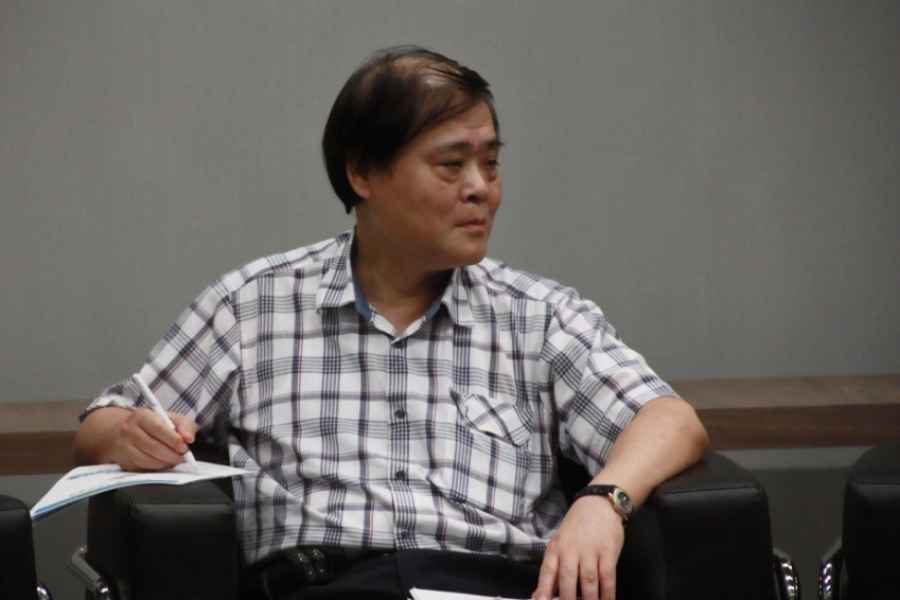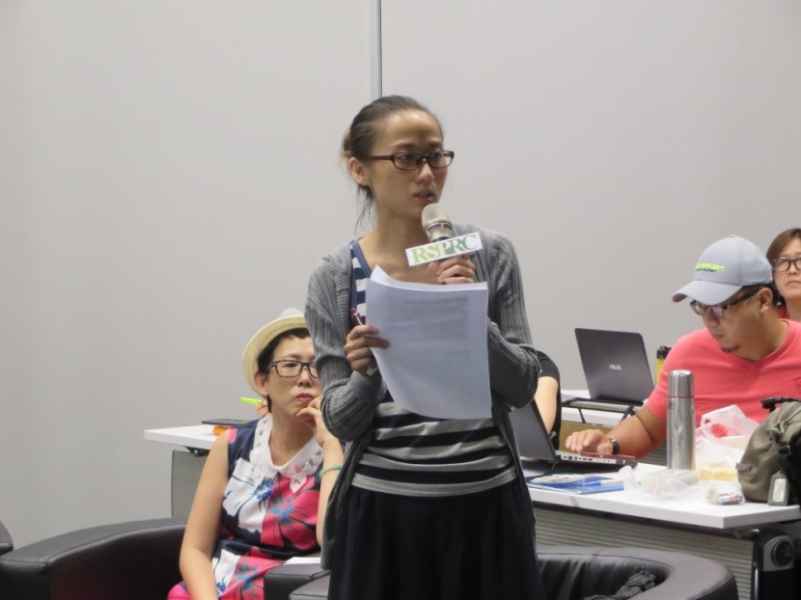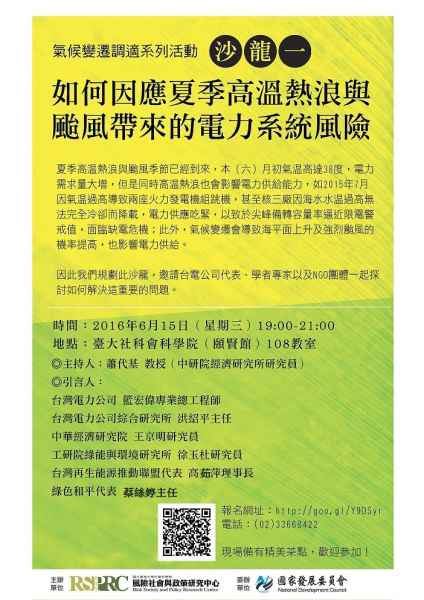Summer season of heat waves and typhoon has arrived; on June 15 this year NTU Risk Society and Policy Research Center organized a climate change adaptation salon on the topic of "how to respond to the risk of electric power system from heat waves and typhoons in summer," taking place at NTU College of Social Science. The event was host by Professor Daigee Shaw from Academia Sinica Institute of Economics, and several guest speakers, Taiwan Power company chief specialized engineer Hung-Wei Lan, Taiwan Power company Research Institute director Shao-Pin Hung, Chung-Hua Institution for Economic Research researcher Kimmie Wang, Industrial Technology Research Institute Green Energy and Environment Research Laboratories researcher Yu-Du Hsu, Taiwan Renewable Energy Alliance president Ru-Ping Gao, and Greenpeace Energy Campaigner Szu-ting Tsai, were invited to discuss the power system problems during heatwaves and to share different opinions and possible solutions.
In the opening, Moderator Professor Daigee Shaw led the audiences to think about the consequences resulting from various scenarios such as power shortage, power generator tripping, and load reduction of the third nuclear power plant. Professor Shaw also briefly mentioned that, under the impact of climate change, we need corresponding adaptation measures, including increasing supply and decreasing demand.

Taipower chief engineer Hung-Wei Lan: high temperature is the major cause of rising power system load.
Chief engineer Lan said the current system overload during summer time purely results from high temperature. With each additional degree Celsius after 33°C, it increases the system load by 400 to 600 thousand kilowatts. In addition to the rising system load, the cooling system for the power unit will also be affected, failing to reach the desired cooling effect.
Further, chief engineer Lan pointed out that Taiwan's power supply condition is very tight, with situation getting worse year after year. One of the most obvious examples of power shortage in recent years was the last day of the university entrance examination last summer. The temperature went high to 37°C, resulting in system overload and "generator heat stroke," a record low of operating reserve in the history (until year end of 2015). The heat wave on May 31 this year led to the lowest percentage rate of operating reserve in the recent decade.
Considering the temporary tight power supply every year caused by high temperature, chief engineer Lan also proposed the specific contingency measures provided by Taipower, "load management", particularly the demand bidding measure on demand side. On supply side, short-time overload will be used to alleviate emergent power shortage. Furthermore, the abundant rainfall brought by typhoon can be used to generate hydroelectric power in order to save the fuel cost for coal-fired power plant. Therefore, the arrival of typhoon as well as good operation and management of reservoir are effective, though temporary, forces of power supply, becoming an opportunity during summer heatwave.

Taiwan Power Company Research Institute director Shao-Pin Hung: In response to climate change, participation by everyone is needed, attending to both mitigation and adaptation.
Addressing similarly as Taipower chief engineer Lan did, Director Hung argued that the phenomena such as tight supply during summer time and planned power blackouts are all caused by rising temperatures. In this case, the adaptation ability, that is resilience in power system, is subject to scrutiny. Good electric power adaptation comes from good coordination among supply, demand, and adjusting resources. In addition, Director Hung mentioned that, the traditional centralized power combination in the future will be developing towards renewable energy, making a more robust power system.
Director Hung further suggested that mitigation and adaptation are closely related to each other despite different definitions. The mitigation condition under climate change will affect the decision-making perspective of overall dynamic adaptation. What are the adaptation policies by Taipower in the face of environmental shocks such as heat waves? Director Hung detailed Taipower’s coping strategies, in sequential order: (1) scenario setting; (2) impact analysis; (3) adaptation measures; (4) policy recommendations. He also made a detailed historical analysis of Taipower's power generation, power transmission, and power distribution to facilitate the development of a comprehensive assessment of risk management on adaptation. Director Hung briefly concluded that, participation by everyone is needed to respond to climate change; the key is the electric power; both mitigation and adaptation should be addressed!
Chung-Hua Institution for Economic Research researcher Kimmie Wang: How to conduct risk communication with general public?
Compared to the professional analysis of electric power provided by chief engineer Lan, Researcher Wang stressed the importance of "communication" concept. Researcher Wang said that the impact brought by typhoons and heat waves caused by climate change is part of the risk. In the face of risk, so-called risk handling is needed, which refers to adaptation here.
However, Researcher Wang suggested that the most difficult part is not drafting risk management strategy, but "how to engage risk communication with general public," an extremely difficult part. Even if we know that climate change is indeed happening, it is unable to change our ‘unbelieving.’ Because of our cognitive bias, in the absence of good communication, such deviation makes people not to believe the fact that climate change has already occurred. Therefore, we need to respect the human innate cognitive bias before designing a good communication model, and then establishing risk communication with citizens, in order to jointly face climate change and to execute adaptation strategies.
Industrial Technology Research Institute Green Energy and Environment Research Laboratories researcher Yu-Du Hsu: Extreme weather will be strengthened by other effects.
Researcher Hsu said that extreme climates such as heat waves and typhoons cause more than single-dimensional damages, and are strengthened by combining other effects (such as urban heat island phenomenon in Taipei), which is a compound effect. When normal phenomenon of extreme events took place at the wrong time, it causes compound damages and impact, such as composite occurrence of storm surge brought by typhoon, astronomical tide, and coastal erosion. Therefore, in order to deal with such a compound effect, when formulating adaptation measures in response to climate change, other issues should be considered at the same time (such as nuclear waste issues, etc.).
With similar view with Researcher Wang, Researcher Hsu said the biggest challenge is that it is very difficult to prove the current adaptation strategy is correct. Before the event occurs, how do we persuade some people who do not believe? Executing adaption strategy before everyone questions it might possibly encounter restrictions. Therefore, Researcher Hsu suggested that “future scenario” settings be used to facilitate decision making, with future estimation replacing past experience. A complete future scenario setting can help to find a more clear direction regarding adaptation strategy execution. At the same time, it takes time to execute adaptations, and efficient mitigation can help to win more time.
Taiwan Renewable Energy Alliance (TRENA) president Ru-Ping Gao: the more serious power shortage, the more needs for green power!
TRENA President Gao suggested that the power shortage situation caused by extreme climates such as heat waves actually highlights the value of renewable energy and green power. Take the university entrance examination last year for example, although high temperatures caused problems to three large Taipower operating units, many wind turbines on that day produced more electricity than planned Hence, in such an emergency situation, renewable energy can actually produce stable power supply. Moreover, even direct sunlight causes high temperatures, the time period with the most sunlight makes solar power to be helpful in extreme weather!

In addition to emphasizing the importance of renewable energy and green power in extreme climates, president Gao also pointed out the importance of energy saving. In many places, even universities, with NTU included, still have lots of room for improvement in reducing peak demand. President Gao called on the new government to involve both Ministry of Education and Ministry of Economic Affairs to improve energy efficiency in colleges and universities. Finally, she reiterated the importance of green power, and called on Taiwan to think about how to stimulate the growth of green power in a short time.
Greenpeace Director Szu-ting Tsai: We need to continually change the energy consumption behavior, and the legislation should also follow up as soon as possible.
Regarding the issues of power management, energy-saving measures and promotion of renewable, Director Tsai focuses on the supporting regulations and implementations. She also stressed that, looking at energy-saving effects in all counties and cities, there is still a large room for improvement. Regarding the promotion of renewable energy, she pointed out that regulations and government policies can help to grow renewable energy. She gave an inspiring example: For the first time, the United Kingdom saw production of solar power exceeding that of coal-fired plants on April 9. This outcome is made possible by its renewable energy bill. In the face of future shocks, such as power shortage, caused by extreme climates, the key is the implementation of renewable energy and energy-saving measures. In order to achieve those goals effectively, Director Tsai appealed that we need to continually change our energy consumption behavior, and the government should also speed up by keeping up with appropriate regulations.
Professor Shaw summarized in the end of salon.
Regarding the power cut problems worried by Taipower, Professor Shaw suggested that the electricity price should be allowed to return to the level where it should be at. It is the right policy direction, and the public opinion should also support it. Besides, it is necessary to amend the policy regarding the cost sources of renewable energy, but people also need to agree on it before the policy measures being proposed. He ended the salon by quoting: " Rise and fall of a nation rests with every one of its citizens!"
Error
Joomla Gallery makes it better. Balbooa.com








